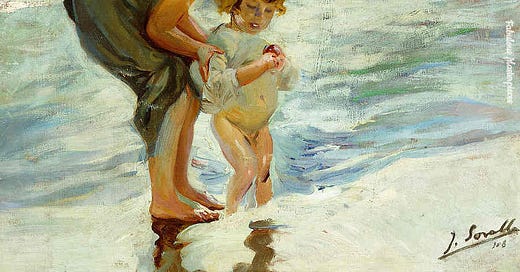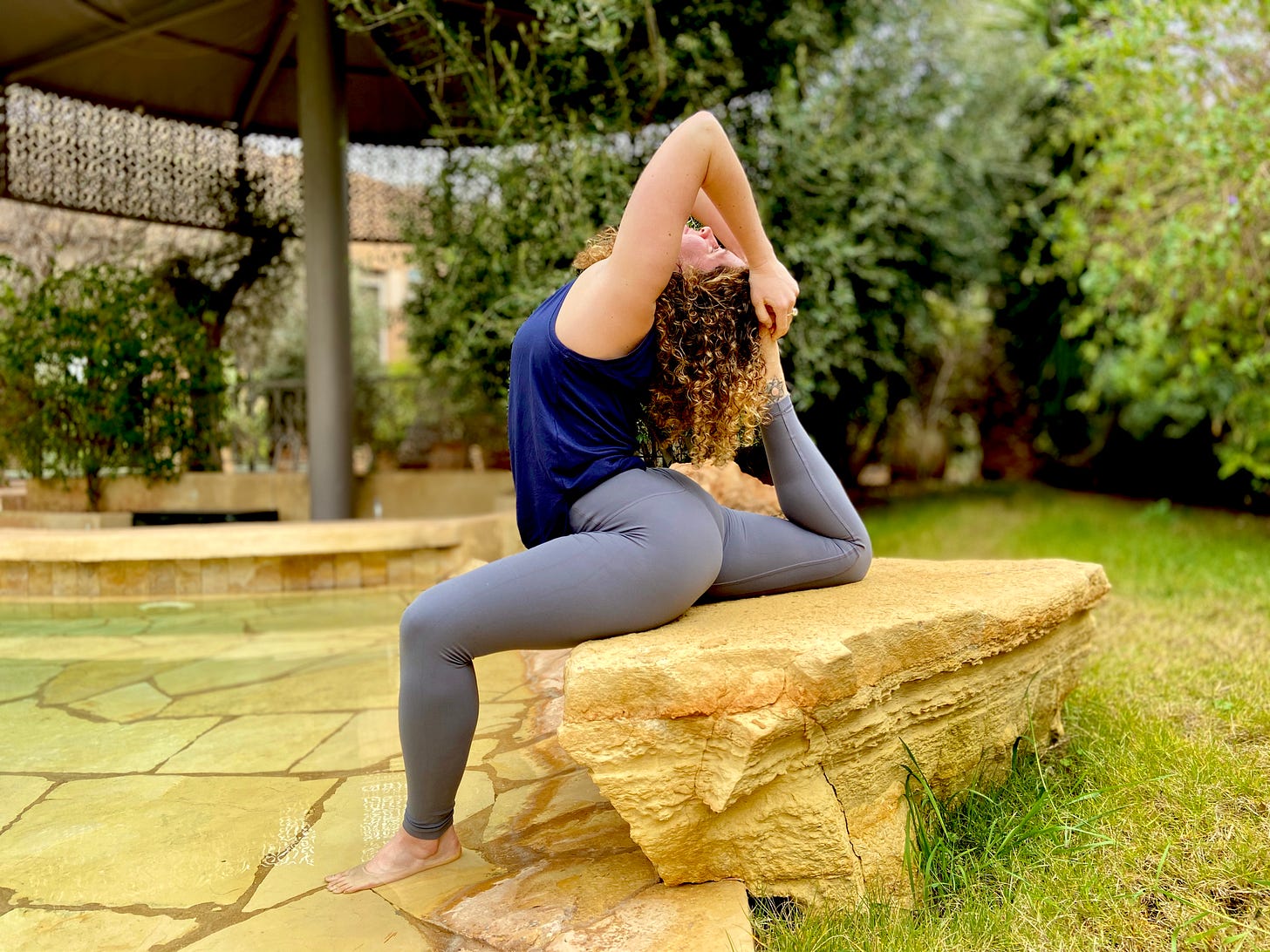When I was pregnant with my first child, I spent a lot of time thinking about and preparing to give birth, but not much time thinking about becoming a mother. If I tried to think about what my life would be like after the baby was born, I struggled to picture it. It was hazy and unclear, the details shifting and retreating if I tried to focus on them, like something half seen in a dream. This was a little surprising to me, as unlike many women, I actually had quite a bit of experience with babies. I am the second eldest of six children, and I remember my youngest sister being born in the front room whilst we children ate our breakfast in the kitchen when I was 10 years old. I used to cuddle my younger brother back to sleep when he woke in the night. I had vague memories of changing nappies and rocking prams and reading bedtime stories. Yet none of this prepared me for the reality of becoming a mother myself. I don’t mean that I wasn’t prepared for sleepless nights or dirty nappies or having to feed a small helpless infant every two hours. I hadn’t yet experienced those things but I had mentally prepared for them and wasn’t surprised when they happened. They were hard, sometimes brutally and painfully hard, but not unexpected. I mean that I wasn’t prepared for the seismic shift that occurred in myself. I had prepared for every aspect of my life to change, but had somehow expected that I would remain exactly the same. It wasn’t just that my daily routine was different, or that I was doing different things with my time, I was somehow different, in a profound way that I struggled to articulate or understand.
The carefree, adventurous woman who spent her twenties travelling the world, reading voraciously, and debating philosophy and religion till the early hours, was gone, replaced with an exhausted, irritable and frequently overwhelmed woman who struggled to form a coherent sentence and would burst into tears over things as seemingly trivial as the dishwasher being stacked incorrectly. Where I had previously spent hours a week practising yoga, I was now pacing the streets trying to get my fretful baby to sleep. I had become a stranger to myself.
My recollection of those early months with my daughter are a blur, a mixture of sleepless nights and overwhelming anxiety, interspersed with moments of intense joy. I adored my baby, and loved being a mother, but I missed my old self more than I wanted to admit. I began to resent my husband, whose life appeared to carry on much as before, whilst mine felt like it had shifted on its axis.1
A lot of the advice I read online seemed to encourage me to try and reclaim my old self as much as possible. I was urged to make self care a priority, to prioritise my hobbies, and above all, to make sure I didn’t “lose myself” in motherhood. In practical terms, this advice seemed to mean encouraging my baby to be more independent of me.2 The problem was, my baby resisted any and all attempts to encourage independence. She would only sleep either attached to the breast, in the sling, or lying next to me. She refused to entertain a bottle, caring not a jot that the precious ounces of expressed milk had taken hours to pump. She would not nap on a regular schedule, and would only lie under her baby gym or in her bouncer for a few minutes at a time. The more I tried to hold cling to the vestiges of my old self, the harder I found the endless demands that were placed upon me by motherhood, and the more resentment I felt towards my husband and baby.
I had wanted to become a mother, but I hadn’t been ready for what that meant. The process of becoming a mother, also known as matrescence, is so much more than the act of giving birth. The transformation from maiden to mother, of which childbirth is just the initial rite of passage3, is a process of death and resurrection. The maiden must die for the mother to be born.4
Matrescence: the process of becoming a mother
I think it’s probably natural to want to hold onto your pre-children self, especially as we live in a culture that places a high value on maidens and a low value on mothers. Early motherhood is an overwhelming, isolating experience for many women, so of course it is natural to cling to your old self. What I’m not so sure of is that doing so actually serves women in their transition to motherhood. You can’t be reborn unless you first allow yourself to die. I wasn’t able to become the mother I wanted to be until I accepted that I was going to have to allow myself to be completely overhauled from top to bottom.
The modern idea is that losing yourself in motherhood is a bad thing to be resisted. I have an inkling that we’ve got this backwards. Maybe motherhood is meant to be all encompassing in the early years, after all, human infants are the most vulnerable and dependent creatures on the planet. Maybe if women were encouraged to lean into the discomfort of shedding their old self rather than resisting it, they would find the process easier?
I’m not saying new motherhood is easy, because it’s not, or that new mothers should not be given support and empathy. I firmly believe they should be given plenty of both. Rather, I’m saying that instead of encouraging them to fight the transformation that motherhood requires, new mothers should be encouraged to view it as a fundamentally worthwhile process, not a pathological one. When athletes endure rigorous training to prepare themselves to compete, they do it willingly because they believe their goal to be worthwhile. No one exhorts them to make sure they don’t lose themselves in their sport, in fact their dedication and sacrifice is celebrated.
Paradoxically, the more you resist change, the harder it is, and since I have wholeheartedly embraced motherhood (with all its demands and limitations), I have found it much easier and more freeing. I gave birth to my second child three months ago, and despite life objectively being more challenging with two than it was with one, I’ve found this postpartum season to be far more easeful and joyous than with my first. As
so eloquently puts it:“It almost sounds silly, but choosing motherhood as your primary calling when you are a mother is good. It is the ultimate good. This choice enables us to be free- free within the chosen confines of the home and family we have made. This is because when women make motherhood their whole identity, they are much more likely to make room for it.”5
Motherhood has been the greatest gift of my life. It has not only given me my two precious daughters, it has given me the gift of becoming a mother. It has drawn out and forced me to cultivate virtues that I would never have had any reason to develop otherwise. I am better for it, wiser, kinder, more patient, less selfish. If you let it, it’s the ultimate self development hack, far more effective than any yoga retreat or self help book.
As
wrote in her recent piece, Lost in Motherland, “I’ve become well and truly lost in motherland, but that’s a good thing – in many ways the best thing that ever happened to me.”I’d love to hear about your experience of matrescence and the transformation motherhood brings. Let me know in the comments! As always, if you enjoyed this piece then please share and subscribe. You can also support my work by donating on Buy Me A Coffee :)
This, I should add, was not due to my husband failing to support me. He was in fact endlessly supportive, taking on many of the household tasks in addition to working full time, using his annual leave so that I was able to return to part-time self employed work when our baby turned 6 months.
A lot of modern parenting advice seems geared towards eliminating as much of the inconvenience of early parenthood as possible. New mothers are encouraged to sleep train their infants, to feed them on a schedule, to make sure they accept a bottle so that other adults can participate in feeding. The difficulties of motherhood (and the perfectly normal demands of infants) are increasingly pathologized, rather than seen as a difficult but generally normal part of life.
If you haven’t already read it, then I urge you to read Reclaiming Childbirth as a Rite of Passage by Dr Rachel Reed for more on this.
The Triple Goddess is a female deity/ archetype made up of Maiden, Mother & Crone, each of which symbolise a different stage in the life cycle of a woman.
The Maiden represents youth, new beginnings, beauty, enchantment and expansion, and is represented by the waxing moon;
The Mother represents fertility, stability, nurturing, power and life, and is represented by the full moon;
The Crone represents wisdom, death, and endings, and is represented by the waning moon.






This definitely rings true to me.
At the same time I do sense the need to “be my own person” and that’s actually the reason I am here on Substack, writing. But that person isn’t who I was before motherhood, she's totally different as a mother (and I would say also as a wife/homemaker, they’re all quite linked). I’ve always loved writing, but never published anything I really cared about before. Now, I feel much more confident and solid in myself and my thoughts and opinions, wile also being welcoming of others. The maiden has died so the mother could be born, but in a way I was happy for her to die; she was so sad and insecure. Who I am now is much stronger, more vibrant, powerful and effective.
Well - you're just at the beginning! Thanks for your thoughts, very interesting to read. I'm nearly 39 years in to motherhood and now a grandmother as well, a whole added dimension, almost never discussed. It's all a continuing process of discovery, challenge and growth - and yes, pain as well as joy.